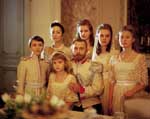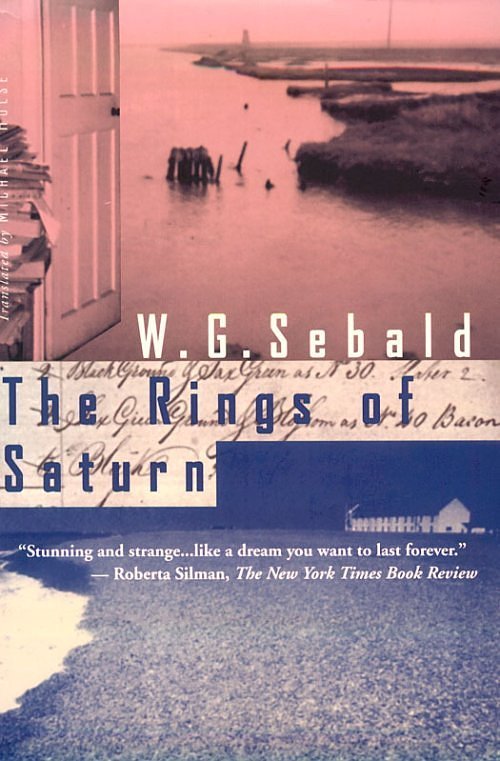
| Walking
Through History: Russian Ark and The Rings of Saturn
by Mike Shen |
|
While movie adaptations often barely resemble the books they're based on, sometimes a film and a book with no affiliation end up having a great deal in common. Two such works I've come across in the past year are Alexander Sokurov's groundbreaking film Russian Ark and W.G. Sebald's hypnotic novel The Rings of Saturn. Shot
in an unbroken eighty-six minute take, the longest in film history,
Russian Ark brings us on a walk through St. Petersburg's
Hermitage Museum, former winter palace of the tsars. The first-person
camera slips not just from room to room but from century to century,
from a gallery filled with But the film's best moments are its quietest, when the camera chases wordlessly after the ghosts it encounters -- Princess Anastasia and her playmates, laughing on their way to breakfast, or an aging Catherine the Great, huffing her way through a snowy garden. The absence of editing emphasizes the physical reality of the palace, solidifying the illusion of traveling through history; Sokurov evokes the meditative calm one feels walking through an empty museum, the sense that old, grand buildings are in reality vessels collecting time. Like a poet obeying the strictures of the sonnet, Sokurov finds freedom in constraint, creating a real-time film that escapes real-time. The
Rings of Saturn also chronicles a walk, this time through the
coastal towns of Suffolk County, England. Sebald's narrator, a melancholy
academic, sets out in hope of "dispelling In novels and especially in films, history often becomes epic -- big men, big women, big battles -- the aerial view from which, Sebald's academic says, "it is as though there were no people, only the things they have made and in which they are hiding." Recounting a visit to Waterloo, he wryly notes that a monument to the battle exists near Brighton in the form of two copses, viewable from the air, planted in the shape of a Napoleonic hat and a Wellington boot. The Rings of Saturn and Russian Ark avoid the deceptive clarity of that perspective. Both works take a different approach to history, one well-applied to visiting foreign cities: the best way to see a place is not to ride through it or fly over it, but to get out and walk.
--Mike Shen Discuss
this article on the nextPix FORUM by going to its discussion
thread:
[click here] |

| |
 |
Euro Screen Writers Articles on Euro film, research, plus a great cache of interviews with such directors as Godard, Besson, Agnieszka Holland, Peter Greenway, and Fritz Lang. |
 |
Done Deal: A current list of the latest industry script sales. |
 |
UK's Film Unlimited Truly unlimited, one of the best film sites going. Plenty of news, reviews, special reports, features, and PREVIEWS. |
 |
Screen Writer's Utopia! What are they, who wrote them, who's doing them, and what you can expect. |
 modern-day
tourists, past glimpses of Peter the Great and Pushkin, into a freezing
museum workshop during the Nazi siege of Leningrad. A remarkable
feat of staging and cinematography, the film employs no fewer than
fifteen hundred actors, including two on-camera orchestras; in the
astonishing finale, scores of brilliantly dressed soldiers and aristocrats
whirl away the evening at the Great Royal Ball of 1913.
modern-day
tourists, past glimpses of Peter the Great and Pushkin, into a freezing
museum workshop during the Nazi siege of Leningrad. A remarkable
feat of staging and cinematography, the film employs no fewer than
fifteen hundred actors, including two on-camera orchestras; in the
astonishing finale, scores of brilliantly dressed soldiers and aristocrats
whirl away the evening at the Great Royal Ball of 1913.
 the
emptiness" that has taken hold of him. As he walks, he launches
upon a mental odyssey encompassing,
among other things, the life of the Chinese Empress Tzu-Hsi, the
atrocities of Croatian
militiamen during WWII, the metafiction of Borges, the history of
the silk industry, and the symbolism of the herring trade. Sebald
writes in mercilessly lucid, unbroken paragraphs of forty pages
or longer, and, like Sokurov's single take, these immense blocks
of text create a continuity that grounds us as we skip from epoch
to epoch. The academic, like Sokurov's ghostly narrator, seems to
have a tenuous grip on time: as he enters a dilapidated manor, he
declares that he cannot "readily say which decade or century it
is, for many ages are superimposed here and coexist."
the
emptiness" that has taken hold of him. As he walks, he launches
upon a mental odyssey encompassing,
among other things, the life of the Chinese Empress Tzu-Hsi, the
atrocities of Croatian
militiamen during WWII, the metafiction of Borges, the history of
the silk industry, and the symbolism of the herring trade. Sebald
writes in mercilessly lucid, unbroken paragraphs of forty pages
or longer, and, like Sokurov's single take, these immense blocks
of text create a continuity that grounds us as we skip from epoch
to epoch. The academic, like Sokurov's ghostly narrator, seems to
have a tenuous grip on time: as he enters a dilapidated manor, he
declares that he cannot "readily say which decade or century it
is, for many ages are superimposed here and coexist."
